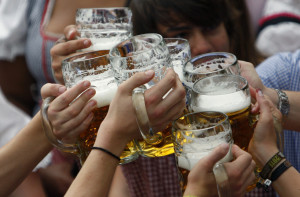First Amendment violation? WI city looking to restrict alcohol, tobacco ads

NO MORE CHEERS?: The Wisconsin city of Lodi is considering whether to impose heavy restrictions on alcohol and tobacco advertising in the community.
By Adam Tobias | Wisconsin Reporter
LODI, Wis. — Attention Lodi business owners: Your city government is looking to infringe on your First Amendment rights.
Mayor Paul Fisk has proposed an ordinance prohibiting alcohol and tobacco advertisements within 500 feet of schools, playgrounds, parks, recreation facilities, child-care centers and libraries.
The ads also cannot be visible from those same locations, even if the distance exceeds 500 feet, or appear on banners, exterior illuminated signs and motor fuel islands.
Fisk told Wisconsin Reporter his motivation for the ban is creating a new culture in Lodi by keeping alcohol and tobacco advertising from minors.
Fisk says he got the idea while working with the Lodi Community Action Team, a nonprofit that promotes alcohol and other drug-free choices among youth.
Neither Pete Madland, executive director of the Tavern League of Wisconsin, nor Curt Witynski, assistant director of the Wisconsin League of Municipalities, had heard of other cities in the state imposing these kinds of restrictions.
But if history elsewhere is any indication, the proposed ordinance, if passed, probably won’t hold up in court.
“This sends up all kinds of First Amendment red flags,” said Thomas C. Kamenick, associate counsel for the Wisconsin Institute for Law and Liberty.
Many organizations throughout the country have been successful in fighting similar limitations.
A Rhode Island law prohibiting the advertising of alcohol prices except within liquor stores was invalidated in 1996 by the U.S. Supreme Court because of infringements on First Amendment freedoms.
Two student newspapers in Virginia were allowed last year to publish alcohol ads after a U.S. Court of Appeals determined the state law blocking such practices violated the First Amendment.
A student publication in Pittsburgh also benefited from the same ruling in 2004.
Additionally, the Lorillard Tobacco Co. won a U.S. Supreme Court case in 2001 after Massachusetts implemented a ban on tobacco advertisements and sales within 1,000 feet of schools and playgrounds.
The court found the regulation on tobacco advertising was too broad and restricted the company’s First Amendment rights.
Kamenick foresees the same thing happening to Lodi if Fisk’s code amendment is ultimately approved.
To outright ban speech, which Kamenick says the ordinance does, the government would have to show such a law is the least restrictive means necessary to achieve a compelling interest.
Kamenick also believes that, because of Lodi’s smaller size, very few places will fall outside of the 500-foot threshold.
“I hope that the Lodi City Council defeats this proposed ordinance,” Kamenick said. “Passing it could open the city up to potential litigation and even substantial damages if businesses’ profits suffer as a result.”
The ordinance cites a 2007 Journal of Adolescent Heath report that states: “Sixth and seventh graders exposed to high levels of alcohol advertising are 50 percent more likely to drink than children with low exposure to such marketing.”
But after conducting years of research, Jon P. Nelson, a Penn State professor emeritus of economics, has found marketing exposure does not lead to more underage drinking or smoking.
NO SMOKE: Some tobacco and alcohol ads could be prohibited in Lodi under an ordinance being proposed by the mayor.
“You can probably find one or two studies that might support what (the mayor) is saying, but if you look at the evidence collectively, I don’t think his position is supported,” Nelson said.
Underage drinking also appears to be on the decline, according to survey by the National Institute on Drug Abuse and the University of Michigan.
The two groups report alcohol consumption rates for eighth-, 10th- and 12th-graders have continued to decrease for close to 20 years, hitting record lows in 2013.
More than 45,000 students from 395 public and private schools participated in the survey.
“We’re doing some things right here,” Madland said. “We’re winning this battle.”
The advertising ban would have little, if any, influence on the respective companies’ sales, according to Fisk.
Madland strongly disagrees.
“I’m not a marketing expert, but obviously beer distributors and businesses feel there is value to put these things out there, otherwise they wouldn’t do it,” Madland said. “To think it’s not going to impact them, I think, is very shortsighted.”
Madland contends the city would be traveling down a slippery slope if the ordinance passes.
“This opens up a whole new can of worms,” Madland said. “I mean, where does it end?”
The city plans to hold a public hearing on the matter Feb. 11.
Contact Adam Tobias at atobias@watchdog.org or follow him on Twitter @Scoop_Tobias
The post First Amendment violation? WI city looking to restrict alcohol, tobacco ads appeared first on Watchdog.org.







